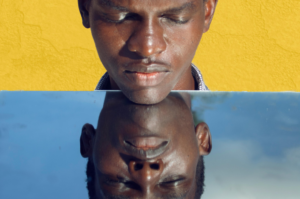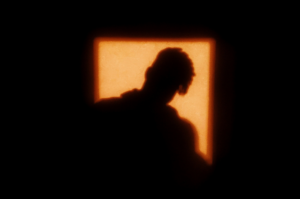For weeks the city of Port-Harcourt was agog with whisperings of what transpired on Olozu Street. Who was the girl? Was she really sixteen? Were the accusations true that she had ordered food at Lulu’s Place with no intention of paying? Whatever became of her? Was she lynched? There were predictions that come Christmas the city would be flooded with calendars, their pages riddled with cartoons depicting the saga.
The last time folks were so moved that they resorted to calendar making was over a decade ago, when a man driving back from a party had struck an aged woman at Waterlines junction, an accident that resulted in the disintegration of his vehicle into four equal parts. The man was in for further shock when he alighted from his car only to discover a goat lying dead on the road. The calendars that year were a massive hit.
The Olozu matter, as people now called it, promised to be even more massive. The speculation it brewed was enough to fill the pages of a hundred gossip papers. It became a sort of street currency for one to say that they had been at Lulu’s on the fateful day the girl walked in. Witnesses no longer needed enticements of lunch, during which brown envelopes were slipped under the table; they came in droves, of their own accord, inundating the journalists, relishing the spotlight.
A supermarket attendant in D-Line called Ufuoma gave the following account: “Well, I can’t say much, but yes, I was there. I saw everything with my koro-koro eyes. All I know is that the girl came inside and the way she was walking, shaking her buttocks, I thought maybe her father was the owner of the place. Not knowing that she is a common thief. In the end, they used too much force on her, I know. But she herself should not have been proud. That’s all!”
At Abuluoma jetty, a shifty-eyed young man who gave his name as Ikechukwu AKA Jazzy, claimed to have seen a different robbery.
“The girl fine, no question. Her dress na runway. Necklace and earring, pure gold. I look am well-well, and me I deal in gold, you understand, so I know. Some people say they see her drop hair and flies inside food. Me, I no know that one sha. Many people deal in jealousy. What me I know is gold. Now everybody is saying what the girl did is not good, this and that. My question is, where is that gold she was wearing? Somebody snatched that gold. Nobody is saying anything. This life is not fair sha.”
A curious trend was soon observed among the alleged witnesses. Some appeared to believe that a conspiracy was in play. “See, my name is Tega, and it is a lie. A big lie! I was there, sitting beside the girl. There was no single fly or hair or anything in her bag. Human beings are dangerous. Why would she come to eat and not want to pay? I suspect these people just wanted to deal with this poor girl. Maybe she offended one of them somewhere before. But to beat her, then naked her like that? Pursuing her on the road? I think they planned for her long time ago. People are dangerous, you know.”
Several other accounts emerged, none perhaps as damning as that offered by an individual claiming to have interacted with her minutes before the incident. Unlike the others, he was reluctant to be interviewed. After much coaxing, however, he agreed to give a statement. He gave his name simply as Pushe.
“I fear no man,” he said, eyes wide with what may have been intended as courage, but seemed actually like terror. “With my naked eyes, I saw her drop fly inside the soup. Me, I tell the truth as I see it. I fear no man. I saw her, live and direct! The girl was very afraid, shaking. If you’re not guilty, why be afraid and shaking? Even when they asked if she has done this kind thing in another restaurant, the girl’s body was shaking like person with malaria fever. So she is guilty. Me I am not saying it is good what they did oh, but I know what I saw with my naked eyes. Now, where is my money?”
For weeks after the incident, it was this way. The city was haunted by a slew of conflicting tales which seemed only to brew more questions which in turn inspired more tales, and so on. Was the young girl guilty at all? How many witnesses were there? Who were her people? Why was she running? Why did she do it at all? Had she no money to pay for a common meal? Why had she not concocted a better plan?
Time passed, and the questions whittled down, receding from the minds of ordinary people. They referred less and less to the incident. It was almost as though they were quietly waiting for the Rumor Calendars to surface at year’s end. At a point, one question alone remained, passed around, deliberated upon only by those devoted newspaper analysts and great thinkers in the land, whose sole mission, from time immemorial, was to separate themselves from the world, the proverbial wheat from chaff, finding succor in each other’s company.
After contaminating the food, after refusing to pay, after the beatings, after being stripped naked, the young girl, in a moment of terror, had broken away and begun to run. One question alone was worth asking: where was she running to?
“To heaven,” declared John-Bosco, philosopher, and key member of the band of men devoted to the study and practice of draught at the street corner. “She was running from hell to heaven. It is a long journey, like crossing The Sahara Desert. Many have gone and tried, some have come back to sit at home. Some have even died along on the way. Some are still there even sef. The question is whether she reached the other side or not.”
“My friend you are drunk,” said his opponent on the board, Bello, a former doctor disgraced from practice for prescribing morphine to himself. Bello took a gulp from a small bottle and said, “Then again, so am I. But you are still the champion draught player. One of the best.”
“Not one of,” John-Bosco corrected with a scowl. “The best.”
After ten straight games, six of which John-Bosco had won, it was arguable that he was the best. Sitting on a bench, facing each other, backs slouched, eyes screwed up in concentration, both men had vowed to play an additional three games. But three had easily become seventeen and the pair showed no signs of stopping. Not even when their spectators grew bored and abandoned them. Exhausted though they were, neither was willing to admit to the other what each one saw as defeat.
“John-B, this thing you are saying, you’re making sense oh. You remember there was a time in this town when something peculiar happened at Waterlines. You heard of it? Everyone’s heard of it. A man is driving back from a nightclub, sees an old woman appear in front of him. He swerves right, she follows him. He swerves left, she follows him. Then he …”
“Jams her hard.” John-Bosco punched an open palm. “Kpoa!”
“Instantly, his car scatters into four. Top, bottom, right and left. Nothing happened to the man,” Bello said, his words slurring. “Apart from a laceration above the eye.”
John-Bosco held up his thumb and index. “Tiny scratch, yeah, very tiny. I know the story,” he said, nodding with gusto, tongue swiveling around in his mouth.
Bello reached out for his draught piece, pausing halfway through a play to glance at his opponent. “I know you know. But did you know that the animal was injured, intestines pouring out? I saw it myself. And not a single drop of goat blood flowed on that road.” Shaking his head, he slid a piece.
John-Bosco retaliated immediately, decimating two of Bello’s pieces. “Jesus Christ, I don’t remember that one o!” he said, smiling furtively.
Bello scrunched his nose, glaring at the board. This was more than just a game to him. This was war. “What of when her son arrived?” he said, through clenched teeth.
“Whose son? The goat’s son?”
Bello cleared his throat, and narrated how a well dressed man had arrived the scene driving a Mercedez Benz. The man ran out, threw himself on the ground and held the goat, screaming Mama, mama!
“Mama ke!”
“The crowd lynched him immediately. No questions asked. Kicks, blows. He confessed to them his mother was in the house, an old woman, seriously sick. Supposedly, a doctor told them she needed blood.”
Smiling like a cat, John-Bosco slid a piece. “Tell me something.”
“That got the crowd wild again. ‘Ohoo, so she came to the road to drink blood, abi?’ They beat him seriously.”
“Lynching! But it is good. They should beat him well-well. Son of goat is driving Benz. Son of man is trekking. Nonsense!”
“Eventually, the police came, carried him away, to save him, they said, but you know them. You know what they are always after. That day there was huge traffic because of the wreckage. But the people hauled it out of the way, and traffic began to flow again. They pushed the broken up car, but no one wanted to touch the goat.”
“Why didn’t they take it home and cook it?”
Bello was stunned by John-Bosco’s question. He shook his head and continued. “For two days a mammoth crowd gathered there, waiting.”
“Two whole days! For what? They don’t have work?”
“Watching and waiting, my drunk friend. Now, can you tell me what they were waiting for? Your move.”
John-Bosco lifted a piece, calmly ate three of Bello’s pieces before answering. “Miracles?”
“Wrong. What of the man the police took? Can you tell me where he is now?”
“In his house, of course. Watching Television.”
“I see. What of the man coming from the nightclub, the one who jammed the old woman, where is he now?”
“Home?”
“What of the goat?”
John-Bosco threw his head back and laughed. Bello soon joined in. “Okay, okay, the young girl they caught in that restaurant. She was naked, running towards GRA. A crowd was chasing after her. Where do you think she is now? Your move, my drunk friend.”
The drunken philosopher known as John-Bosco, renowned for his ruthless play when it came to draught, lifted his piece and held it to his chest. He was silent for a long time, his mood suddenly pensive. He looked Bello in the eye. “What girl?”
Bello nodded slowly. “Never mind.”
The pair played on in silence, a silence disrupted by the occasional clatter of draught pieces, a silence that seemed to stretch on, much like their need to play, for hours, until finally they shook hands and stumbled away, the silence splitting into two, trudging behind each one, a conscience, a shadow.
*************
About the Author:
Zino Asalor’s stories have appeared recently in New Literati, The Missing Slate, Lampeter Review, Waxwing and Barcelona Review. A writer of fiction and poetry, he lives in Port-Harcourt, and is working on his first novel.











Zino A August 10, 2016 18:17
Thanks Osahon and Iriagbonse for your lovely comments. :-)